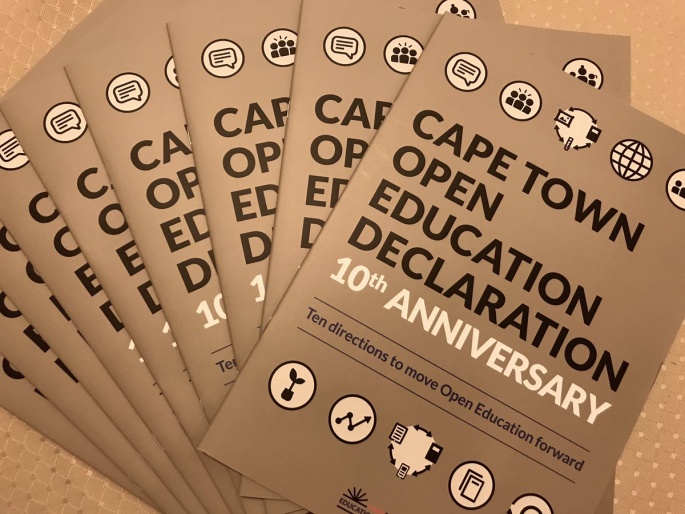CPT+10 : Ten directions to move Open Education forward


(Source: CapeTownOpenEducationDeclaration, under a Creative Commons Attribution 4.0 International License)
Cape Town Open Education Declaration 10th Anniversary: Ten Directions to Move Open Education Forward (CPT+10), - is a collaboratively produced document highlighting ten key areas where the Open Education movement can grow in the next decade.
CPT+10 was officially launched on 18 September 2017 during a satellite event at the 2nd World Open Education Resources (OER) Congress in Ljubljana, Slovenia. The satellite was attended by more than 100 delegates, and featured short talks and reflections highlighting how the various themes related across different countries and contexts. Using the ten directions as a launching point for new connections, collaborations and ideas, CPT+10 aims at getting a conversation going.
The 2nd World OER Congress marked five years since the World OER Congress was held in Paris in June 2012. The Congress followed the theme »OER for Inclusive and Equitable Quality Education: From Commitment to Action«, |
The CPT+10 document is an outcome of a March 2017 meeting held in Cape Town to reflect on the ten years since the Cape Town Declaration, how far we have come, and where the movement will evolve into the future. It is a collaborative effort of a team of activists from multiple organisations around the world.
"The Open Education movement must begin to consider the interrelationships between Open Content, Open Data, Open Learning analytics tools, and pedagogy - both the opportunities and the challenges ... For example:
The open education movement needs to grapple with these and related issues", - DATA AND ANALYTICS, Exploring the intersection of open content, open data, and open learning analytics #cpt10 |
Check out the CPT+10 website, booklet, join in on the conversation at #CPT10 and help Open Education community promote this initiative.
Related:
- Open Education Consortium (The Global Network for Open Education)
- #OEGLOBAL18 : Open Education Global Conference 2018 (to take place in Delft, The Netherlands, 24-26 April 2018) : Registration Available
- Open Knowledge Festival takes place on 3-6 May 2018 in Thessaloniki, Greece
- Open Standards, Data, Source, and Innovation as Principles for Digital Development [+ related: 12 October : FREE Conference in Tanzania : How to put the Principles for DIGITAL DEVELOPMENT into practice]
- ETICO site targeting the issue of ethics and corruption in education [What is OPEN DATA]. The site belongs to UNESCO’s International Institute for Educational Planning
- Open Educational Resources: the future of Education, co-created with You
- OER Accessibility Toolkit : accessibility for Open Education
- OPEN RESEARCH Open Textbook. Reflect on Reflection
- 2016 Open Source Yearbook
- OpenForis : Free Open-Source Solutions for Environmental Monitoring
- Thesis Commons : a free, cloud-based, open-source platform

